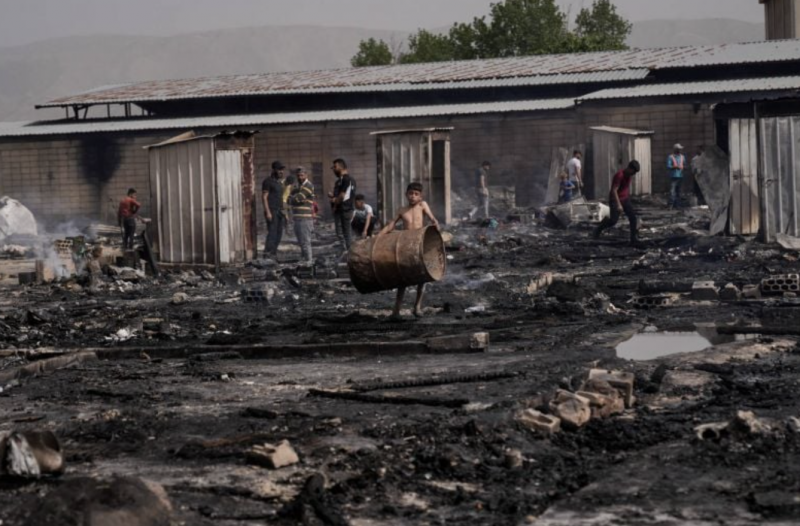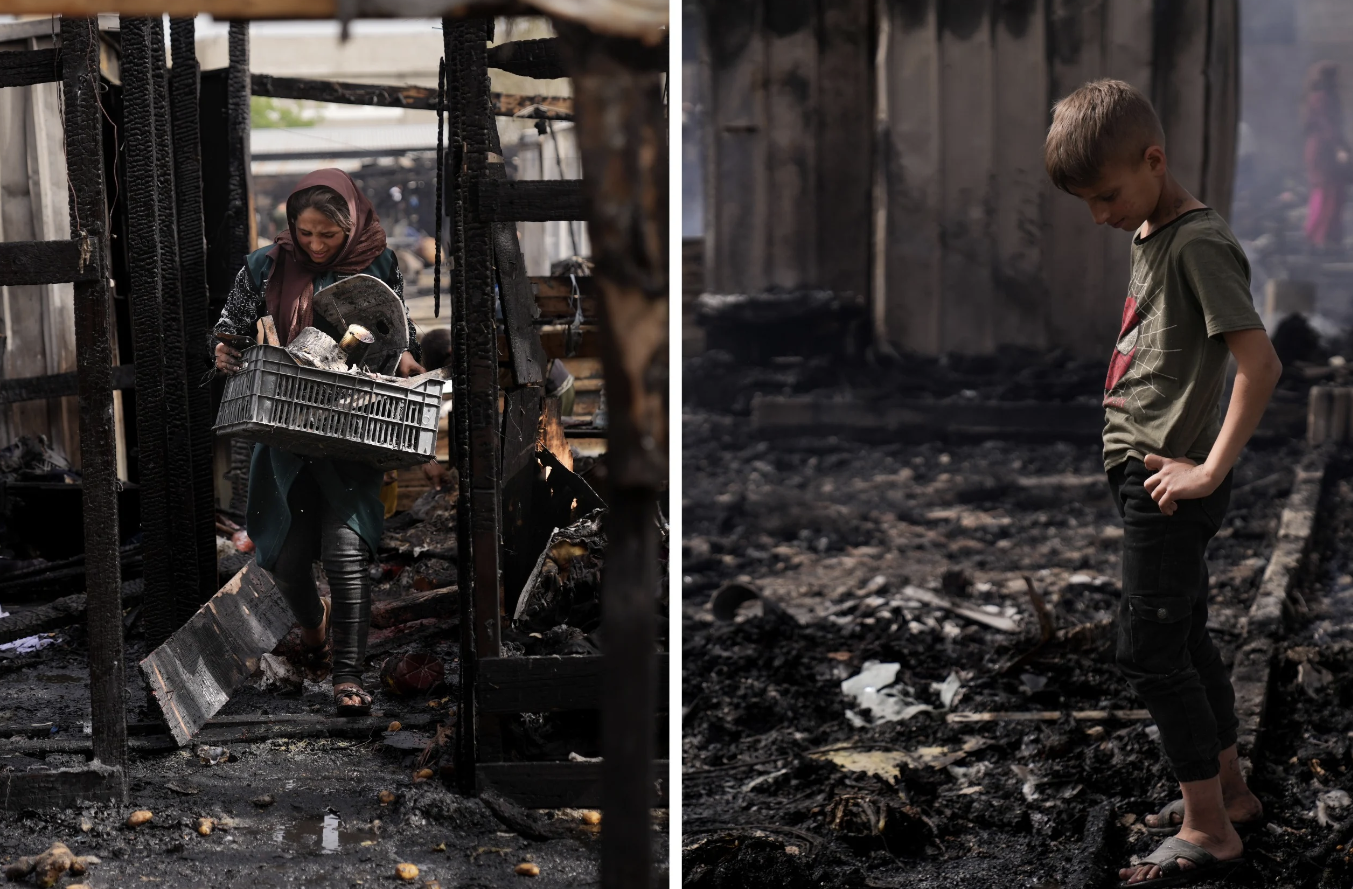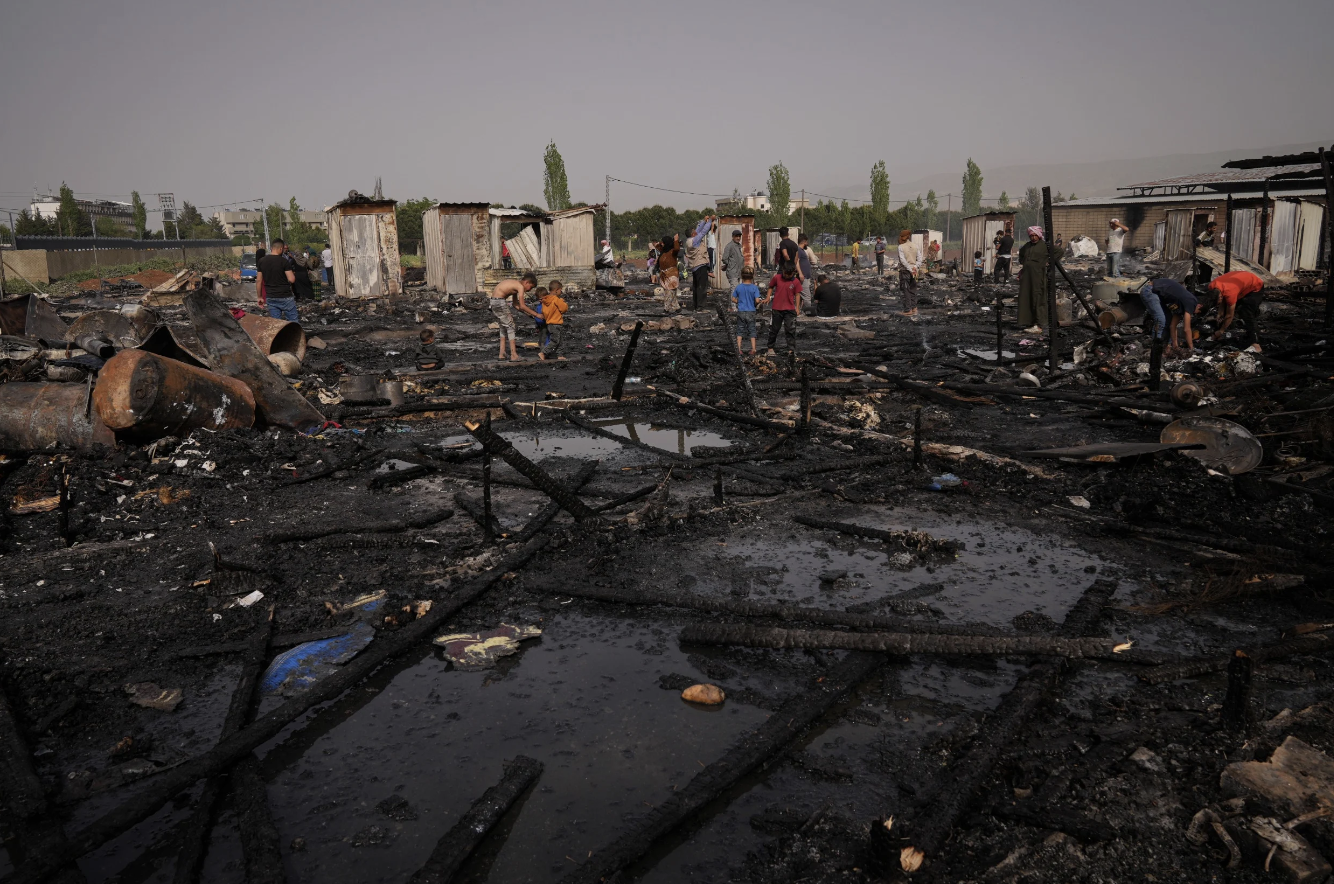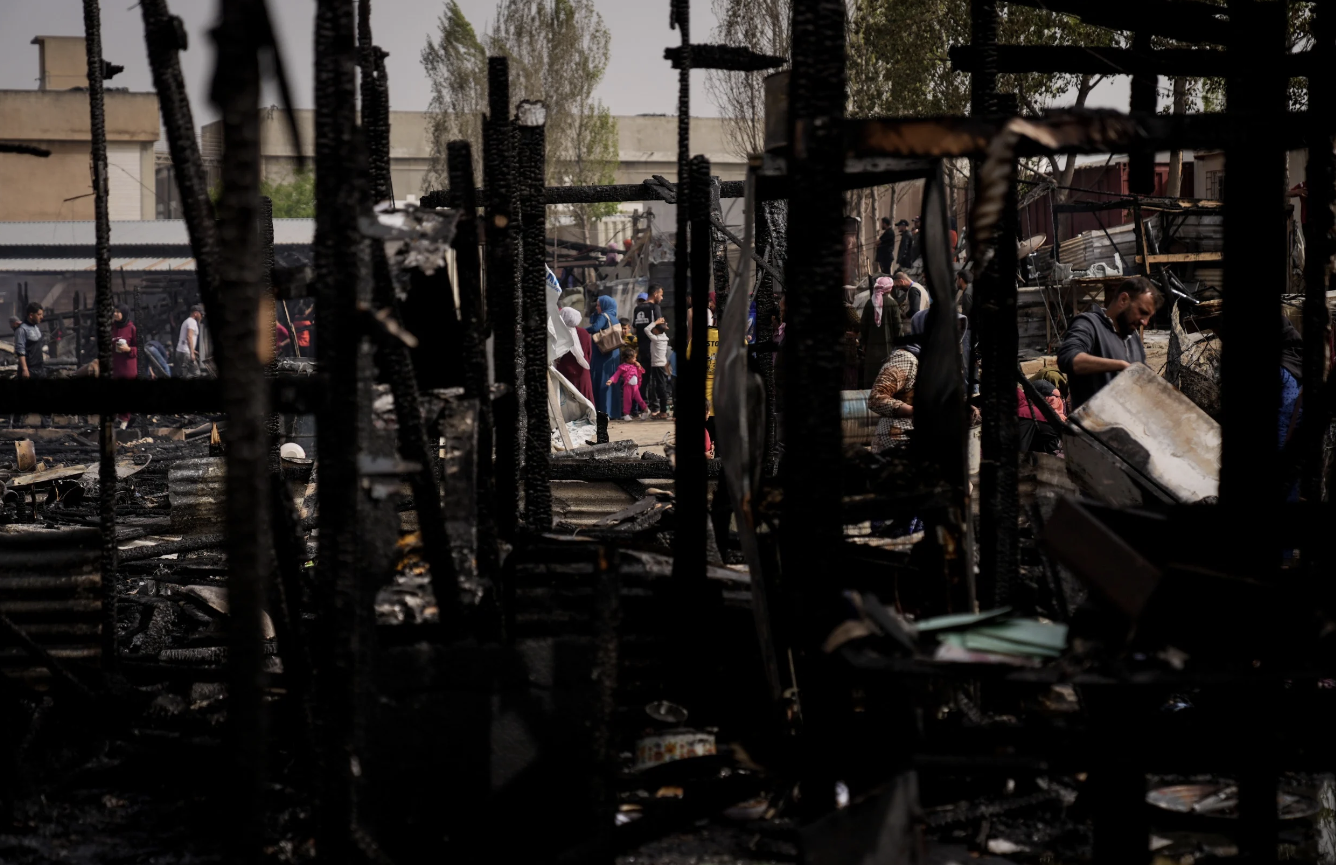
A child carrying a barrel as he walks across the burnt-out field, in a refugee camp in Zahle, April 22, 2024. (Credit: Mohammad Yassine/L'Orient-Le Jour)
Just meters away from the Zahle motorway in the Bekaa area, the “Hamed al-Hassan” camp, home to 480 Syrian refugees, has been reduced to ashes. Children with blackened hands played among the debris, while white smoke continued to rise from the charred remains of the 6,000-square-meter site.
Meanwhile, adults wandered amidst the rubble, hoping to salvage a few belongings untouched by the flames, but their efforts proved futile.
Broken china littered the ground, a burnt bicycle lay discarded, and remnants of half-burnt cloth were scattered about. Amidst the devastation, a lone communal toilet stood as a grim reminder of their former existence.
 Syrian refugees trying to find belongings spared from the fire, in a refugee camp in Zahle, April 22, 2024. (Credit: Mohammad Yassine/L'Orient-Le Jour)
Syrian refugees trying to find belongings spared from the fire, in a refugee camp in Zahle, April 22, 2024. (Credit: Mohammad Yassine/L'Orient-Le Jour)
Around midday on Monday, a major fire erupted in one of the makeshift shelters within the camp.
“I saw my neighbor’s tent engulfed in flames, and despite our efforts to douse it with water, we couldn’t stop it,” said Fatima*, a refugee from Aleppo whose husband is disabled.
“I urgently called for help to evacuate him. One of my sons sustained injuries, his foot was bleeding profusely,” she added, still in shock as she emerged from the haze of soot.
The Civil Defense promptly responded, taking over an hour to bring the fire under control.
“The fire spread rapidly due to the high temperature, wind, and the presence of flammable materials such as petrol, rubber, and gas in the tents, compounded by their proximity,” a local Civil Defense official, Fayez al-Sheiyeh, told L’Orient-Le Jour via a phone call. Fortunately, no casualties were reported.
 The Hamed al-Hassan camp in Zahle, ravaged by flames, April 22, 2024. (Credit: Mohammad Yassine/L'Orient-Le Jour)
The Hamed al-Hassan camp in Zahle, ravaged by flames, April 22, 2024. (Credit: Mohammad Yassine/L'Orient-Le Jour)
“The cause of the fire is currently unknown, but a thorough investigation will be conducted,” he added.
“It was an accident, a faulty electrical connection,” explained Mohammad*, a refugee from Aleppo. “We’re at a loss, we have nowhere to go. We’ve lost our home, both here and in Syria,” added the father of six.
‘The Lebanese don’t want us anymore’
In the camp, situated near the offices of the UN High Commissioner for Refugees, NGO workers and UNHCR staff are engaging with the victims.
“They are conducting assessments,” said a UNHCR worker, speaking anonymously, “to coordinate aid efforts with relevant authorities, such as the mohafez [governor], and other partners.”
The worker further elaborated that the UNHCR intends to establish a “collective” shelter to provide temporary accommodation for fire victims unable to find refuge with relatives. “At this point, we’re uncertain whether they’ll be able to rebuild,” the UNHCR worker added.
 A child wanders among the debris in a refugee camp in Zahle, April 22, 2024. (Credit: Mohammad Yassine/L'Orient-Le Jour)
A child wanders among the debris in a refugee camp in Zahle, April 22, 2024. (Credit: Mohammad Yassine/L'Orient-Le Jour)
Amidst the debris, Zahra, who introduced herself as the camp “coordinator,” was surveying the remnants of her former tent. “At times, six families shared the same shelter,” she said.
While some displaced people are uncertain where they’ll spend the night, Zahra and her family of five young children plan to seek refuge with relatives.
“But how long can they endure hosting us?” she said.
Zahra fears the worst: “The Lebanese no longer want us; we’ve become a burden to them. I fear this fire will serve as justification for our expulsion.”
Since the murder of Pascal Sleiman, an official of the Lebanese Forces (LF) in Jbeil, at the beginning of April — arrests of Syrian suspects followed — the country’s Syrian nationals have encountered a resurgence of political agitation demanding their departure.
This campaign, despite reservations expressed by NGOs and international organizations, has been accompanied by numerous acts of violence targeting them.
“Some Lebanese even came to take photos of the fire and were laughing,” said Fatima, who relocated to the camp two years ago. “Now I’m going to sleep on the streets... I fear we won’t be able to return.”
Mohsen al-Zein, a Lebanese farmer whose landlord rents out the farmland where the camp is situated for approximately $400 per year per tent, visited the site to witness the extent of the tragedy firsthand.
“We’ll assess how we can assist them,” he said.”Here, relations between Lebanese and Syrians are peaceful.”
 Syrian refugees trying to find belongings spared from the fire in a camp in Zahle, April 22, 2024. (Credit: Mohammad Yassine/L'Orient-Le Jour)
Syrian refugees trying to find belongings spared from the fire in a camp in Zahle, April 22, 2024. (Credit: Mohammad Yassine/L'Orient-Le Jour)
“Some people claim that the Lebanese set fire to the camp,” said Mireille*, a shopkeeper situated just a few steps from the camp. “We don’t do such things; we endure a lot.”
Mireille said she hopes that “the camp will never be re-established.”
“You should have seen how many people came out of there,” she said. “It demonstrates that there are far too many of them.”
This article was originally published in L'Orient-Le Jour. Translated by Sahar Ghoussoub.